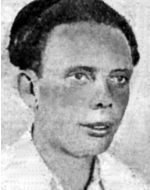Greenfeld, Yehuda-Arieh
Son of Esther and Joseph-David, was born on April 5, 1917 in the city of Wielun, Poland, and grew up in Lodz. As a member of a rabbinic and Hassidic family, he studied at the Talmud Torah and Torat Chesed yeshiva in Lodz and remained loyal to Hasidism all his life. Yehuda-Aryeh studied general studies in world literature and especially attracted to poetry and philosophy. Even after entering a work life, he continued to study the evenings. He joined Poalei Agudat Israel and worked to improve the status of his classmates. Yehuda Aryeh organized religious youth groups called “Sinai,” which taught them Torah and documentation and planted a love for all the holy people of the nation and the Land of Israel. Always aspired to ideological depth and a fundamental foundation of his worldview. He was an excellent religious fellow who was decorated with special qualities. He excelled in particular as a popular speaker and in his public appearances at meetings he fascinated all his listeners in his juicy, expressive language. He also wrote in the local Jewish press, and especially in the weekly Yidishe Arbeiter Shtime. At the outbreak of the Second World War, he was sent along with his family to the Lodz Ghetto, where he belonged to the underground and was active in the cultural union in the ghetto. In 1944, with the mounting pace of extermination, was transferred to Auschwitz death camp. His parents, sisters, and other members of his family were killed and he and his two brothers were sent to the Buchenwald camp. In this period of time he managed to save many from death. After his release from the Buchenwald camp he began organizing Kibbutz Buchenwald with others. In Germany he wandered from camp to camp and worked in organizing cooperative kibbutzim. On Rosh Hashana 5706, he immigrated to Israel with Kibbutz Buchenwald and settled in Kibbutz Afikim, where he was very fond of the local people, and his admiration for nature and the landscape was expressed in lyrical songs, some of which were printed in the kibbutz newsletter. Chafetz Chaim, who was closer to him ideologically and religiously and from there was recruited for educational work in the immigrants’ camp in Atlit, where he was able to recover many lives and tried to help everyone. Which was essential in the immigrant camp, fell on 9 Iyar 5708 (18.5.1948) in the Egyptian bombing of the central bus station in Tel Aviv. All the things that were with him in Scripture were burned. His body was barely identified by his brother. He was laid to rest in the military cemetery at Nahalat Yitzhak.
